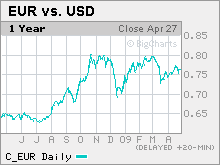Dollar mixed after Fed
Central bank says the economy is weak but that the pace of decline appears to be slowing.
NEW YORK (CNNMoney.com) -- The dollar remained weak against the euro and the pound Wednesday after the Federal Reserve said the economy is still hurting but that the pace of the decline appears to be slowing.
The dollar was down 0.9% against the euro at $1.3273. It slid 1% versus the pound to $1.4777. Against the yen, the U.S. currency gained 1.3% to ¥97.67.
In a widely expected move, the U.S. central bank held its benchmark interest rate near zero and said "economic activity is likely to remain weak for a time." But the Fed also stated that the pace of the economic decline "appears to be somewhat slower."
The Fed said in a statement that it will continue to buy Treasurys and mortgage-backed securities but did not signal any new methods to boost the economy.
"The message is no change," said Sacha Tihanyi, currency strategist at Scotia Capital in Toronto. "They didn't indicate any monetary policy changes or modification to their asset purchase plans, but they did acknowledge some positive signs in the economy."
The announcement came after the government said the economy declined at a sharper-than-expected rate in the first quarter.
Gross domestic product, the broadest measure of economic activity, fell at an annual rate of 6.1% in the first quarter of 2009 after a 6.3% drop in the last three months of 2008.
While the decline was worse than the 4.7% drop that economists had forecast, it also contained some signs the economy is stabilizing.
The decline was driven in part by plummeting business inventories, which could mean the correction cycle is ending.
Additionally, the report showed that individual purchases rose 2.2% in the first quarter. It was the first time consumer spending, which makes up the bulk of economic activity, had increased since the second quarter of 2008.
"If spending is picking up, the stabilization story can still play out as long as we do not have another big shock in the financial sector," said Kathy Lien, director of currency research at Global Forex Trading.
That cautious sense of optimism about the economy gave a boost to higher-yielding currencies, such as the euro and the pound, and undercut demand for the dollar as a safe-haven. ![]()



